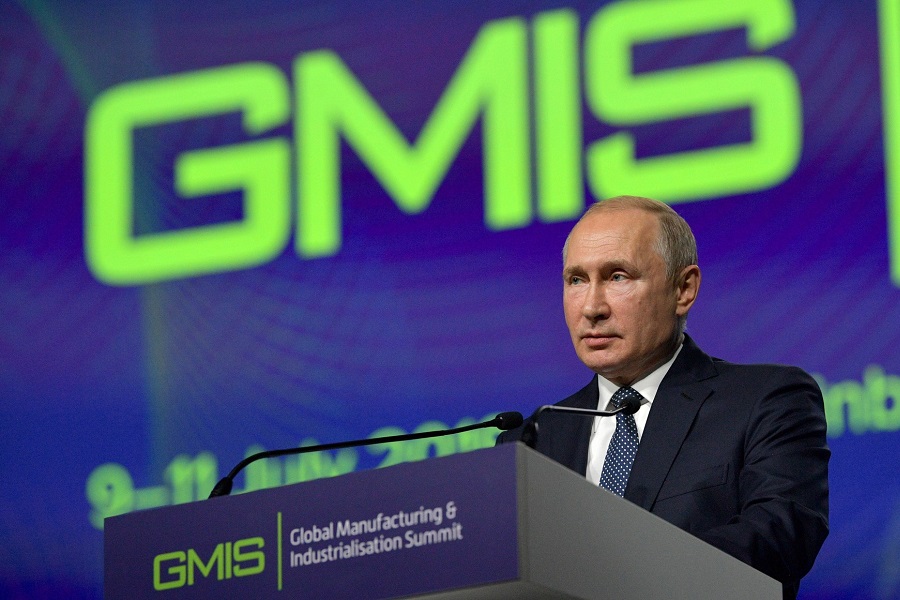Fast transformation is radically changing appearance of entire industries, Putin tells GMIS
By Aliheydar_Rzayev Wednesday, 10 July 2019 1:31 AM

MOSCOW, 9th July, 2019 (WAM) -- The increasingly fast transformation is radically changing the appearance of entire industries, production techniques and business models, Russian President Vladimir Putin said on Tuesday.
Speaking about Russia's vision of long-term trends that determine global development and the risks involved, he said, ''Systems of Artificial Intelligence, AI, 3D-printing, and other developments are exerting enormous influence on the efficiency of management and labour productivity."
He was delivering the welcome speech at the plenary session of the 2nd Global Manufacturing and Industrialisation Summit, GMIS, a joint initiative of the UAE Ministry of Energy and Industry and the United Nations Industrial Development Organisation, UNIDO, which takes place from 9th to 11th July 2019 in the Russian city of Yekaterinburg. He was addressing an audience of more than 2,500 government officials, business leaders, scientists and leaders of the not-for-profit entities.
However, the Russian leader said the hopes about new technologies saving the world from the growing anthropogenic influence and burden largely proved to be an illusion.
The degradation of nature and the climate continues and is increasingly and strongly manifested in droughts, crop failures and natural calamities, he pointed out.
According to forecasts, billions of communication devices and the rapidly growing infrastructure for storing, processing and transferring big data will consume over 30 percent of the world’s electricity by the middle of the next decade. How can we achieve this huge amount of generating capacity? There is no clear-cut answer to this question, Putin said.
That said, he added, building up production capacity and increasing energy consumption in old ways will cause new risks and further climate change. Even now the energy industry accounts for a quarter of all CO2 emissions. The other largest emitters are agriculture, heavy industry and transport, the Russian President said.
''It is not yet clear how to combine the long-term development and production build-up while preserving nature and high living standards. How do we prevent the digital technological revolution, robotisation and the general move to the internet of things from ending in a deadlock without resources and with environmental damage?" he asked.
Will it be comfortable to live on a planet covered in fences of wind turbines and several layers of solar batteries? As they say, it’s like sweeping the rubbish under the rug instead of just cleaning the house, Putin said.
 ''I believe that in order to secure cleaner air, water and food, which also means a better quality of life and longevity for billions of people on our planet, we must offer radically new technologies and more efficient and environmental-friendly devices,'' he noted.
''I believe that in order to secure cleaner air, water and food, which also means a better quality of life and longevity for billions of people on our planet, we must offer radically new technologies and more efficient and environmental-friendly devices,'' he noted.
President Putin said such super-efficient scientific, engineering and manufacturing solutions "will help us establish a balance between the biosphere and the technosphere, as well as to minimise and better control the anthropogenic impact on nature, on the environment."
''This also includes so-called nature-like technologies that reproduce natural processes and systems according to the laws of nature. It may seem strange at first, but fusion energy, which in fact is similar to how heat and light are produced in our star, in the Sun, is an example of such nature-like technologies.'' ''Potentially we can harness a colossal, inexhaustible and safe source of energy. However, we will only succeed in fusion energy and in solving other fundamental tasks, if we establish broad international cooperation and interaction between government and business, and join the efforts of researchers representing different scientific schools and areas. If technological development becomes truly global, it will not be split up or reined in by attempts to monopolise progress, limit access to education and put up new obstacles to the free exchange of knowledge and ideas,'' he concluded.




























Add new comment